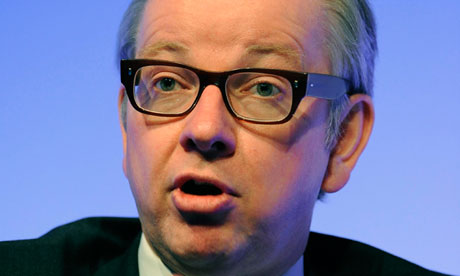
Michael Gove said that when his department had tried to gather information on children's homes it had met a wall of silence. Photograph: Joe Giddens/PA
Sign up to Society daily email briefing
Today's top SocietyGuardian stories
• Michael Gove attacks lack of transparency in children's homes
• Author of bedroom tax report defends findings after government's attack
• Aoife Nolan: Grant Shapps should reconsider his ill-informed UN 'bedroom tax' outrage
• Christina Patterson: The bedroom tax is a bad idea – but welfare reform is necessary
• NHS patients with sepsis dying due to care failings, watchdog says
• Estate agents and surveyors call for house price growth cap
• Opportunities missed to arrest 'floridly psychotic' man who killed woman
• County councils sidelined from nuclear waste dump site decisions
• Binge-drinking increases risk of underweight baby
• Hospital death rates in England 45% higher than in US, report finds
All today's SocietyGuardian stories
Jobs of the week
• Executive director, Médecins Sans Frontières/Doctors Without Borders: "You will be a strong leader with experience of directing and managing organisations, with the ability to generate high performance in others."
• Deputy director of operations, Institute of Cancer Research
• Independent chair, Portsmouth safeguarding children board
• Commissioning Officer, children and early years, Royal borough of Kensington and Chelsea
The Guardian's public and voluntary sector careers page
Hundreds of public and voluntary sector jobs
On the Guardian Professional Networks

• High-rise living is the only way to protect the green belt, writes Hannah Fearn
• Diana Murungu, a specialist palliative care social worker, describes her typical day
• NHS Change Day has demonstrated that patients' experiences can be improved, says Damian Roland
• Things in the Whitehall garden are 'rosy' and the prime minister says neither he nor the civil service need a 'vision', writes David Walker
On my radar ...
• An interesting blogpost by comedian Ted Shiress. He writes that one of the areas where having a disability shouldn't be a major issue is comedy, but presumptions and biases still occur in surprising ways. In a guest post on Dean Burnett's Brain Flapping blog, Shiress, who has cerebral palsy, writes:
Many articles by/about disability seem to have the intention of challenging pre-existing attitudes, which is a noble goal. As for me, I'm not really in the business of changing attitudes; I talk about my disability a lot on stage but that's mainly because I feel the best art lies where there is angst – me discussing my disability on stage is like John Lee Hooker singing about mistreating his ex.
However, one attitude I would like to change is that of certain promoters around how they react to a gig request from someone who has a few problems moving about. I am aware that many comics at my level struggle getting booked and selling themselves more effectively than the other hundred or so comics applying for that gig but it, like many things, just seems that bit harder when you have a disability. Some decent YouTube clips and endorsements from respected promoters prove to have a somewhat limited effect when combined with an indication that you may have a disability. There seems to be some persistent preconception that comics with disabilities will be somehow more of a "risk". On that matter, I've seen a damn few able-bodied comics that are "risky" (and by "risky" I actually mean "bad" because I don't do euphemistic language).
Why should there be a preconception that those with disabilities are worse at telling jokes than those who aren't?
• A report that says too many trafficked children are not being adequately protected by the agencies that are supposed to be supporting them. The report, Still at Risk: A review of support for trafficked children, by the Refugee Council and the Children's Society, said far too many opportunities to protect them are being missed because of a culture of doubt and suspicion among professionals.
• A new campaign launched today to change the debate on benefits. Tom Pollard, policy and campaigns officer at Mind, one of the charities involved in the campaign, writes that the Who Benefits? campaign "is all about the millions of real people, with real problems, who need support from benefits". He blogs:
The situation has to change – we need a more balanced debate about benefits that recognises that, for the overwhelming majority of people who use this support, it is absolutely vital to them. As long as the debate focuses on stereotypes of 'scroungers' and people 'languishing on benefits', we will not get a system that adequately respects and supports the vast majority of people who need support.
Other news
• Independent: David Cameron benefits on welfare at Labour's expense
• BBC: Nuclear plants 'do not raise child cancer risk'
• London Evening Standard: High street policy 'puts prices up'
• Telegraph: Abortion doctors may face private prosecution
• LocalGov.co.uk: Top slice could force council tax rise
• Third Sector: Nine per cent of UK population give the most to charity, says Charities Aid Foundation
SocietyGuardian blogs
Patrick Butler's cuts blog
Sarah Boseley's global health blog
SocietyGuardian on social media
Follow SocietyGuardian on Twitter
Follow Patrick Butler on Twitter
Follow Clare Horton on Twitter
Follow Alison Benjamin on Twitter
SocietyGuardian's Facebook page
SocietyGuardian links
SocietyGuardian.co.uk
The Guardian's public and voluntary sector careers page
Hundreds of public and voluntary sector jobs
SocietyGuardian editor: Alison Benjamin
Email the SocietyGuardian editor: society@guardian.co.uk
No comments:
Post a Comment